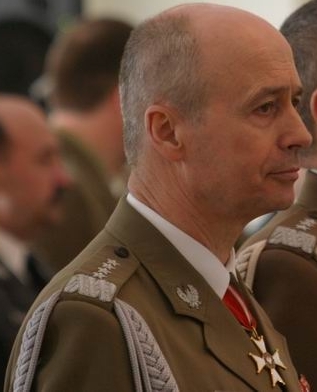
Gen. Czesław Piątas is a Polish general, former Chief of General Staff of the Polish Army. He is one of the authors of the plan of modernisation of the Polish armed forces and one of the architects of its integration with the structures of NATO.

Wilhelm Orlik-Rückemann (1894–1986) was a Polish general, military commander and one of the pioneers of armoured warfare in Poland.

Zygmunt Henryk Berling was a Polish general and politician. He fought for the independence of Poland in the early 20th century. Berling was a co-founder and commander of the First Polish Army, which fought on the Eastern Front of World War II.
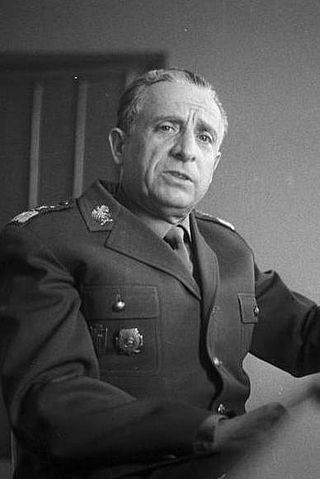
Marian "Marek" Spychalski was a Polish architect in pre-war Poland, and later, military commander and a communist politician. During World War II he belonged to the Polish underground forces operating within Poland and was one of the leaders of the People's Guard, then People's Army. He held several key political posts during the PRL era, most notably; Chairman of the Council of State, mayor of Warsaw and Defence Minister.

General Stanisław Kopański was a Polish military commander, politician, diplomat, an engineer and one of the best-educated Polish officers of the time, serving with distinction during World War II. He is best known as the creator and commander of the Polish Independent Carpathian Brigade and Polish 3rd Carpathian Infantry Division.
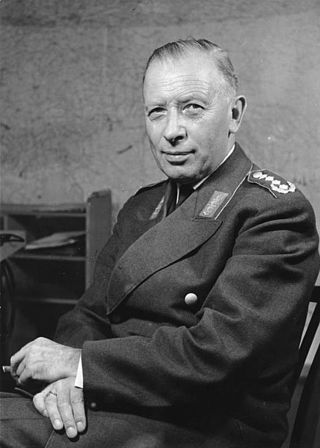
Adolf Bruno Heinrich Ernst Heusinger was a German military officer whose career spanned the German Empire, the Weimar Republic, Nazi Germany, West Germany and NATO. He joined the German Army as a volunteer in 1915 and later became a professional soldier. He served as the Operations Chief within the general staff of the High Command of the German Army in the Wehrmacht from 1938 to 1944. He was then appointed acting Chief of the General Staff for two weeks in 1944 following Kurt Zeitzler's resignation. That year, Heusinger was accused of involvement in the 20 July plot to assassinate Adolf Hitler, but was cleared by the People's Court. Heusinger was later appointed head of the military cartography office when the war ended. He later became a general for West Germany and served as head of the West German military from 1957 to 1961 as well as Chairman of the NATO Military Committee from 1961 to 1964.
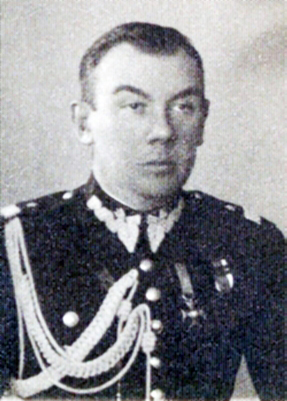
Juliusz Zulauf was a Polish Army brigadier general. A recipient of the Virtuti Militari, he fought with distinction during World War I, the Polish-Ukrainian War, the Polish-Soviet War, and the 1939 invasion of Poland.

Jerzy Maria Kirchmayer was a Polish historian and military commander, a brigadier general of the Polish Army and one of the first historians of the Warsaw Uprising of 1944.

Count Tadeusz Jordan-Rozwadowski was a Polish military commander, diplomat, and politician, a general of the Austro-Hungarian Army and then the Polish Army.

Florian Siwicki was a Polish military officer, diplomat and communist politician. He was a generał in the Polish Army and Minister of Defense of Poland from 1983 to 1990.

Zygmunt Piotr Bohusz-Szyszko was a Polish general. During World War I he served in the Imperial Russian army.

Stefan Adolf Mossor was a Polish general. He was a member of the Polish Legions. From 1928 to 1930, he studied at École Supérieure de Guerre in Paris. In the Second Polish Republic he reached the rank of the lieutenant colonel. He was taken prisoner by the Germans during the invasion of Poland.
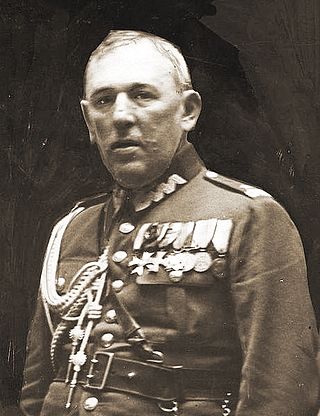
Bernard Stanisław Mond (Spanier) was a Polish general of Jewish descent in the interwar period. He fought in the First World War, Polish–Ukrainian War, Polish–Soviet War and Second World War.
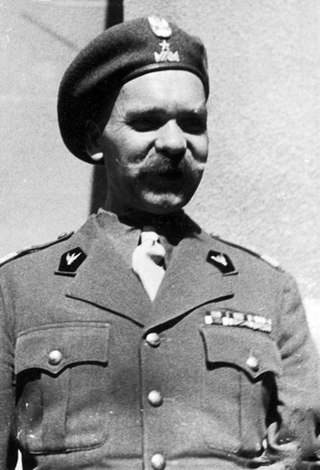
Nikodem Sulik-Sarnowski was an officer of the Russian Imperial Army, and Generał brygady of the Polish Army.

Teodor Kufel, pseudonym Teoch, Ryszard Jankowski was a Polish military and political activist. During World War II he was active in the anti-Nazi movement. After the war, he served as a general in the Polish People's Army. From 1964 to 1979 he was commander of the Internal Military Service.
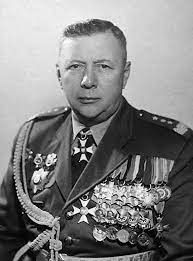
Jerzy Bordziłowski was a Polish and Soviet military officer and communist politician.

Juliusz Hibner was a brigadier general in the Polish People's Army and recipient of the title of Hero of Soviet Union. He also served as the commander of the Internal Security Corps and later became a nuclear physicist.

Bolesław Kieniewicz was a Red Army Lieutenant general who served in the Polish People's Army during World War II and in post-war commanded the Internal Security Corps in the Polish People's Republic.

Józef Użycki was a Polish military officer, and communist politician. He was a general in the Polish Army and the Polish General Staff of Poland from 1983 to 1990.

Bolesław Chocha was a Polish military commander, publicist, and military theorist. Bolesław held the rank of divisional general in the Polish People's Army and also served as Chief of the General Staff of the Army. In addition to his military career, he was a political and social activist. He was born in Grodno and passed away in Józefów.
This page is based on this
Wikipedia article Text is available under the
CC BY-SA 4.0 license; additional terms may apply.
Images, videos and audio are available under their respective licenses.




















